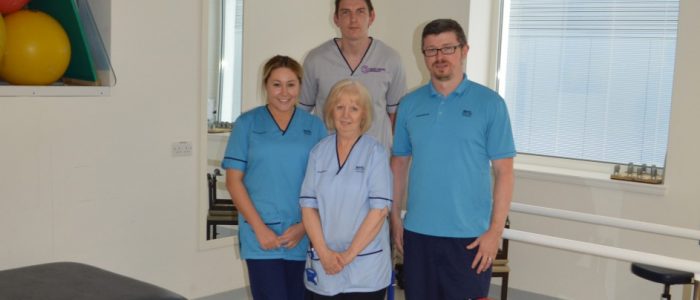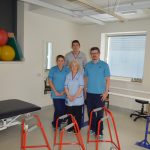New Red Walking Frames To Help Patients With Dementia
Brightly coloured walking frames will soon be appearing in wards across Forth Valley, thanks to a new initiative. The red frames are easier for patients with dementia to see than the traditional grey or silver models which mean patients are more likely to use the aid to help them walk and regain their independence.
The idea to introduce the new coloured frames was developed by David MacKenzie, a specialist inpatient physiotherapist at Forth Valley Royal Hospital after he completed of a Dementia Champion course.
David said: “Following the course, I was particularly taken by the importance of vision and colour for patients with dementia. The hospital environment can be challenging for dementia patients due to lack of contrast between walls, floors and equipment.
“I’d witnessed patients using their table to move around, and realised this was because it was the biggest block of colour in their rooms. Evidence has shown that using a coloured tumbler, with patients with cognitive or sensory impairments, increases fluid consumption by 84% and I thought why not have coloured walking frames too?”
David worked with The Friends of Forth Valley Royal Hospital, a local charity which raises funds for the hospital, to purchase a small number of frames to carry out an initial pilot in Ward B21 at Forth Valley Royal Hospital. Results showed that four out of five patients were significantly more mobile when using the red frames; compliance increased from 18% with grey frames to 61% with red frames. One patient, in particular, went from not being able to walk to being able to move independently with the help of the coloured frame. Now an order has been placed for a further 80 frames.
Dawn Gleeson, NHS Forth Valley’s AHP Co-ordinator at Forth Valley Royal Hospital, said: “This is simple but effective way of making it easier for patients with dementia to be more active. This is not only important for their overall health and wellbeing, but also supports great confidence and independence.”
Nearly 5000 people in the local area and over 90,000 in Scotland as a total are estimated to have dementia and the number is expected to double over the next 25 years. Already health service staff across NHS Forth Valley are being prepared for the challenges of dementia, which, within the space of a generation could result in a third of all patients being treated in emergency departments and acute wards having some form of the illness.
NHS Forth Valley now has specially trained Dementia Champions across the organisation to help drive up standards of care for patients. Regular trainings events are also held to raise awareness amongst staff and ensure better outcomes for local patients.



